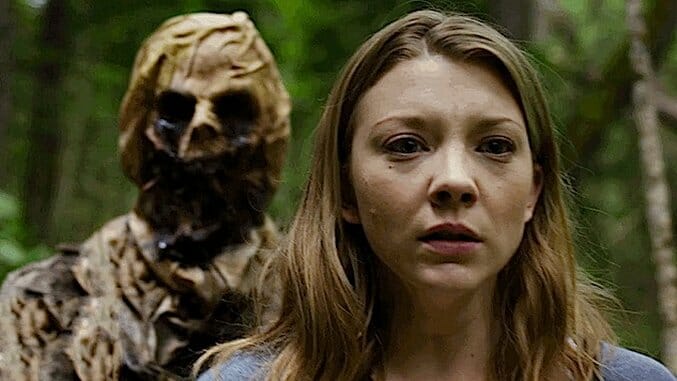Natalie Dormer Takes Us on a Trip through The Forest

We all can’t get enough of Game of Thrones, so it naturally follows we all can’t get enough of Natalie Dormer (and vice versa). She’s known for playing the devious seductress, Margaery Tyrell, on the HBO series, creating quite a following—and her fans won’t be disappointed with her latest role in the thriller The Forest which opens this Friday.
Dormer plays Sara and Jess Price. Yes, two roles and two sisters who are wildly different. When Jess, who’s been teaching in Japan, goes missing in a forest close by, one that’s known for luring unsettled people to commit suicide, Sara goes after her. After meeting a travel journalist, Aiden (Taylor Kinney), at her hotel, she decides to venture into the forbidden woods. When Aiden and Sara go off the beaten path and decide to stay the night, they uncover the true nature of their surroundings. Is the forest actually malevolent or is it all in their heads?
Dormer is no stranger to playing elusive characters, vacillating between angel and demon with her other roles like Margaery, Anne Boleyn in The Tudors and recently with Cressida in The Hunger Games: Mockingjay. Sara and Jess possess no shortage of complexities, and the film manifests them in terrifying and shocking ways. As Dormer puts it, “It’s a smart-thinking person’s horror movie.”
Paste got a chance to chat with the blonde beauty at the New York Essex House Hotel right off Central Park. Dormer opened up about why she’s drawn to characters with demons, embodying women who are warriors and the physical and psychological impact of taking on a horror film. (She recommends spending a lot of time in the sauna.)
Paste: The movie is so great! Congratulations! This is a really smart film.
Dormer:It’s a smart-thinking person’s horror movie. It’s almost like the genre should be irrelevant.
Paste: It does feel that way. I also love your character. We see you play characters will a dual nature already.
Dormer: Oh, that’s interesting!
Paste: And you’re literally two characters here.
Dormer: It’s embodied!
Paste: Yes! Was that something that drew you to the script?
Dormer: No! That’s an interesting observation. If I did that it was a subconscious decision. Wow! You just made me think about analyzing the reason I choose roles!
Paste: Why do you think that that is?
Dormer: That’s something I’ve never thought about before. I love the idea that the central relationship in the movie was the love of two sisters—especially in a genre movie. They’re just textbook examples of how a human being, when they’ve suffered trauma as a child, can go in polar opposite directions. There’s [Jess], the wild child, who goes crazy and then [Sara], the girl who becomes the over-achiever, the suppressor, the control freak. I found that so fascinating—exploring that idea. And the great concept that drew me in the script—that a forest would hold your own demons up to yourself—that you actually, as a character in the piece says, do it to yourself. [Sara] hasn’t processed everything that she’s carrying and repressing. We could all see ourselves traveling half way across the world for someone we love. We all have baggage and history that we’re not proud of. Imagine going into a place where that gets thrown back into your face. Then, hopefully, you’ve got a horror movie that people who don’t normally like horror movies will want to go and watch. Then you’ve got the bang and the scares for the die-hards who love the genre as well.
Paste: You went to this forest! When you were there, as Natalie, were you imagining things? Was it creepy?
Dormer: For me, I felt more sad—philosophical more than anything. You see the tape, the ropes around the trees as you start driving ever closer. You realize—this is a real thing. It’s horrific to think that people are in such pain that they make that decision. I found it a really pensive, philosophical experience as opposed to anything else. It’s a sacred place to the Japanese. It has the light and the dark. It’s a very spiritual place. I found it fascinating that such a location exists.
Paste: This is such a physical movie! Did you do any preparation? You’re running between trees and falling in holes!
Dormer: I’m quite an active person. I run! Thank God I run! Running in a horror movie is like doing interval training, you know? It is a bit like cross fit! Run up and down the room 10 times as you re-set for the take. My body didn’t go into shock when the cardiovascular element of it started. And yeah, because you’re playing heightened-tension, someone who’s got an awful lot of adrenaline running through them, you just make sure you do your yoga every now and then because your muscles hold that tension and you need to let it go at the end of the day. I sat in the sauna a lot! It was Serbia, the Eastern European continent, so they love their saunas and their steam rooms in that part of the world!